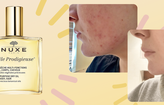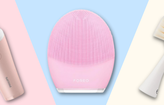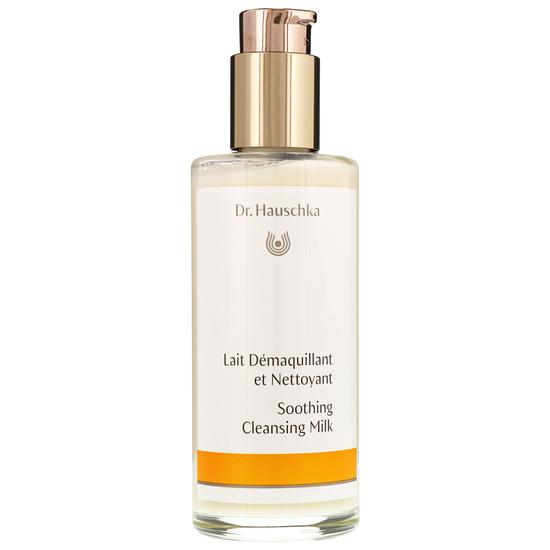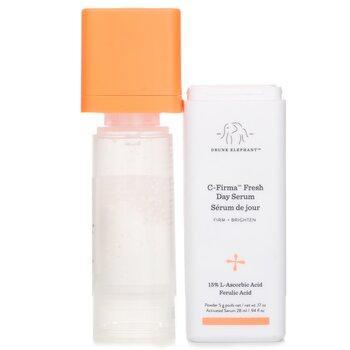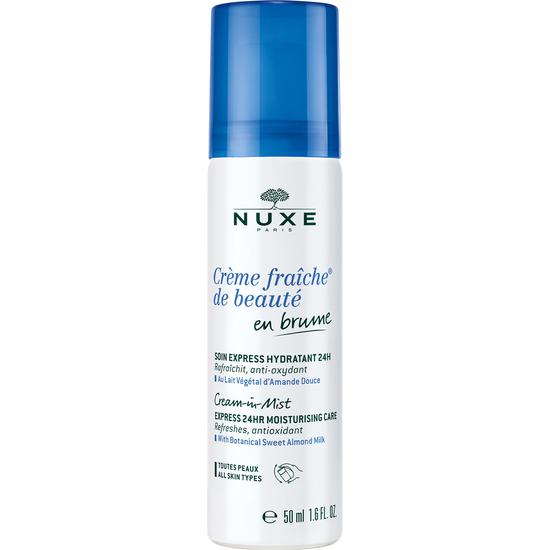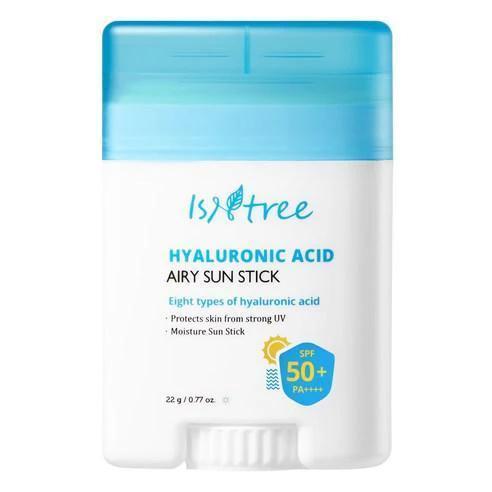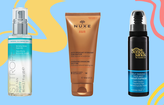
- Skin
- Hyaluronic Acid With Vitamin C
Can You Use Hyaluronic Acid With Vitamin C?
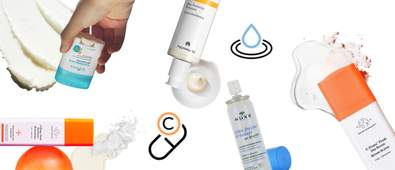
Layering is a skincare enthusiast's favourite pastime; with that comes a certain degree of trial and error, however. Some combinations are somewhat tricky. Then some complement each other like rain and window seats—that is to say, very well. One of those combinations would be hyaluronic acid and vitamin C. Because why not have both a shiny dew and a revitalised glow?
Can You Use Hyaluronic Acid With Vitamin C?
Yes—this duo is a hydration and glow booster
Using hyaluronic acid with vitamin C is a smart move. Hyaluronic acid hydrates and plumps, while vitamin C brightens and protects. Layering them can enhance vitamin C’s effectiveness and help maintain moisture throughout the day.
Apply vitamin C first (on clean, dry skin), then follow with hyaluronic acid and your moisturiser. This pairing suits nearly all skin types and is a favourite among skincare professionals.
What Does Hyaluronic Acid Do For Skin?
Hyaluronic acid (HA) is a powerful hydrating substance naturally produced by your skin and connective tissues. It's renowned for its exceptional ability to retain moisture—holding up to 1,000 times its weight in water. This hydration capability makes it a key ingredient in skincare products aimed at improving skin health, appearance, and overall texture.
As we age, our skin naturally loses moisture and elasticity, leading to wrinkles and dryness. Supplementing with hyaluronic acid topically helps counteract these ageing effects, replenishing moisture, enhancing skin texture, and providing a plumper, smoother appearance.
Key Benefits Of Hyaluronic Acid Include:
- Deep Hydration: Draws moisture deep into the skin layers, ensuring long-lasting hydration and reducing dryness.
- Plumper, Firmer Skin: Adds volume to the skin, improving elasticity and firmness to create a youthful appearance.
- Reduced Fine Lines and Wrinkles: Hydration effect visibly smooths out fine lines and minimises the appearance of wrinkles.
- Enhanced Skin Barrier Function: Strengthens the protective barrier, helping skin retain moisture and defend against external irritants.
- Calms Inflammation: May help soothe redness and irritation due to its gentle, hydrating properties.
- Promotes Healing: Helps accelerate healing of skin by maintaining a moist environment beneficial for skin cell regeneration.
(Source: Cleveland Clinic, Healthline)
Hyaluronic Acid: Universally Suitable And Non-Comedogenic
Dry and Dehydrated Skin: Instantly boosts hydration and relieves tightness or flakiness.
Oily and Acne-Prone Skin: Lightweight and oil-free, replenishes water without clogging pores.
Sensitive Skin: Gentle and calming—ideal for barrier repair and layering with actives.
Normal or Balanced Skin: Maintains hydration and helps other products perform more effectively.
What Does Vitamin C Do For Skin?
Vitamin C, or ascorbic acid, is a potent antioxidant that protects the skin from oxidative stress caused by environmental aggressors like UV rays and pollution. It’s particularly prized for its brightening abilities, helping to fade pigmentation, even out skin tone, and boost radiance.
It also plays a crucial role in collagen synthesis, making it effective in reducing the appearance of fine lines and improving skin firmness over time. Used daily, vitamin C enhances your skin’s defence mechanisms and improves overall clarity. However, due to its acidic nature, it can be irritating when paired with other strong actives unless layered with care.
Key benefits of vitamin C include:
- Brightens Skin: Fades dark spots and hyperpigmentation, boosting radiance and uniformity in skin tone.
- Supports Collagen Synthesis: Promotes firmness and elasticity by stimulating collagen production.
- Protects Against Environmental Damage: Acts as an antioxidant, neutralising free radicals from pollution and UV exposure.
- Evens Skin Tone: Reduces signs of sun damage and post-inflammatory marks for a clearer complexion.
- Enhances SPF Protection: When used in a morning routine, it boosts the protective effects of sunscreen.
- Refines Texture: Improves smoothness and reduces roughness caused by dryness or discolouration.
(Source: Women’s Health, Harvard)
Vitamin C: Suitable for most skin types with proper formulation
Normal to Dry Skin: Look for formulas with added hydrators to brighten and support collagen without causing dryness.
Oily and Acne-Prone Skin: Choose lightweight, water-based serums to reduce post-acne marks and boost glow.
Sensitive Skin: Use lower concentrations (e.g. 10%) and stabilised forms like magnesium ascorbyl phosphate to minimise irritation.
Mature Skin: Highly beneficial for collagen stimulation and fading age spots.
Why Do Hyaluronic Acid And Vitamin C Work Well Together?
Hyaluronic acid and vitamin C make a deeply hydrating and brightening duo. Vitamin C works at the surface and cellular level to even skin tone, reduce pigmentation, and protect against environmental stress. However, it can be drying or irritating for some, especially in high concentrations.
Hyaluronic acid, a humectant, draws water into the skin, keeping it plump, hydrated, and smooth. When paired with vitamin C, it helps buffer irritation and enhances the glow-inducing effects by maintaining a healthy moisture barrier.
Used together—vitamin C first, hyaluronic acid second—they create a visibly brighter, firmer, and more hydrated complexion that’s less prone to dullness or flaking.
Compare Hyaluronic Acid And Vitamin C Side-By-Side
- Primary function: Hyaluronic acid – Hydration and moisture retention | Vitamin C – Antioxidant and brightening
- Reduces fine lines/wrinkles: Hyaluronic acid ✅ Hydrates for smoother look | Vitamin C ✅ Collagen-boosting
- Improves skin texture: Hyaluronic acid ✅ Plumps and softens | Vitamin C ✅ Smooths and evens tone
- Fades hyperpigmentation: Hyaluronic acid ❌ Indirect support | Vitamin C ✅ Brightens and fades spots
- Treats acne & blemishes: Hyaluronic acid ❌ Not acne-specific | Vitamin C ❌ Not for acne directly
- Enhances skin firmness: Hyaluronic acid ✅ Enhances elasticity | Vitamin C ✅ Boosts firmness
- Boosts hydration: Hyaluronic acid ✅ Excellent hydrator | Vitamin C ⚠️ May be drying
- Improves skin barrier: Hyaluronic acid ✅ Strengthens barrier | Vitamin C ⚠️ May cause slight irritation
- Potential irritation: Hyaluronic acid ✅ No irritation | Vitamin C ⚠️ Potential stinging
- Suitable for sensitive skin: Hyaluronic acid ✅ Universally suitable | Vitamin C ⚠️ Sensitive skin may react
Vitamin C Also Works Well With:
Sunscreen – Enhances photoprotection and prevents oxidative damage more effectively when used underneath SPF.
Alpha Arbutin – Fades dark spots and boosts brightening without irritating the skin.
Niacinamide – Fades pigmentation and reduces redness for a more even, radiant complexion when layered properly.
How To Apply Hyaluronic Acid And Vitamin C Together
- Cleanse your face and apply vitamin C serum first in the morning.
- Wait 1–2 minutes for full absorption.
- Apply hyaluronic acid serum or cream to hydrate and plump.
- Follow with a moisturiser to seal everything in.
Finish with a broad-spectrum SPF to protect and preserve your results.
Hyaluronic Acid and Vitamin C
Can they be used on sensitive skin?
Both are generally well tolerated, especially when you use a fragrance-free, stable vitamin C formula with low to moderate potency.
Which should go first: hyaluronic acid or vitamin C?
Vitamin C should be applied first, directly after cleansing. Follow with hyaluronic acid to lock in hydration and prevent dryness.
Why pair them together?
Vitamin C delivers antioxidant protection and radiance, while hyaluronic acid keeps the skin plump and hydrated—ideal for layering in morning routines.
Related Articles:
If you're looking for an effective way to incorporate vitamin C into your skincare routine, serums are a great place to start. Check out our post on The Best Vitamin C Serums for the Face and find out all the best Cosmetify has to offer. For hyaluronic acid, serums are great, yes, but sheet masks are another fun way to get a concentrated dose of HA—they're like a serum and face mask in one. Take a look at our recommendations for all the Best Sheet Masks for Hydration.

Written by Maria Mukaranda
Maria’s background is rooted primarily in creative media and a love for all things written, expressed through experience both online and in print; for creative platforms spanning from music to fashion to beauty.
Top Posts

